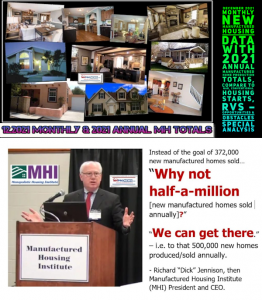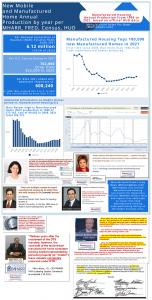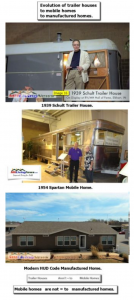New Manufactured Housing Production 2021 Totals Eye-Opening Comparisons-New Conventional and Existing Housing & RV Data

Photo Collage Modern Manufactured Homes provided by MHLivingNews.com/MHProNews.com. The difference between pre-6.15.1976 mobile and post-HUD Code manufactured homes spring to life when homes, images or videos are carefully examined. Click images to increa
"2021 ends...production total of 105,772 [manufactured] homes, a 12% increase over the 94,390 homes produced over the same period in 2020." - MHARR release.
Weiss’ exclusive statements to MHProNews, cited herein, elaborates on his initial statement and data published on MHARR’s website. That noted, to Weiss’ points, a new report and analysis by MHProNews provides a comparison of new manufactured home sales totals from 2021 vs. 2021 new conventional housing sales, existing home resales, and RV industry sales, among others. See that data-packed report below.
https://www.manufacturedhomepronews.com/masthead/december-2021-monthly-new-manufactured-housing-data-with-2021-annual-manufactured-home-production-totals-compare-to-nar-conventional-housing-starts-rvs-opportunities-obstacles-special-a/
In emailed replies to MHProNews, Weiss continued: “Given that the United State faces an affordable housing crisis where millions of additional homes are needed, inherently affordable manufactured homes should routinely have annual production levels in the hundreds-of-thousands of new homes. Why isn’t the manufactured home industry doing better? That’s due primarily to discriminatory zoning exclusions and placement restrictions plus the ongoing unavailability of secondary market securitization by Fannie Mae and Freddie Mac. Yet federal laws were enacted by wide bipartisan margins to address both issues. The Manufactured Housing Improvement Act of 2000 (2000 reform law), enacted with wide bipartisan support, included what’s commonly called “enhanced preemption” over discriminatory zoning laws. Indeed, Democratic lawmakers involved in the passage of that law insisted that then HUD Secretary Mel Martinez use the authority provided under that law to intervene in cases of zoning discrimination against affordable manufactured homes. And that legislation applies equally to Republican or Democratic administrations,” said Weiss.
“Additionally,” Weiss explained “the Housing and Economic Recovery Act (HERA) of 2008 -- also enacted by a wide bipartisan margin -- established, for both Fannie Mae and Freddie Mac, a mandatory Duty to Serve (DTS) certain specified markets including the mainstream manufactured housing market. More than 13 years later, however, DTS is still not a reality for the vast majority of the manufactured home consumer financing market.”
MHProNews asked MHARR’s Weiss and Manufactured Housing Institute (MHI) leaders and counsel questions related to the freshly-released data.
Q1) MHProNews asked Weiss: ‘MHARR has previously called for Congress in its oversight role to investigate the problematic implementation of the Manufactured Housing Improvement Act and enhanced preemption. Congress held hearings in 2011 and 2012 on those topics. A decade has passed. Should Congress, and other state or federal agencies, initiate such an investigation now?’
Weiss-A1. “Congress should conduct further oversight regarding continuing implementation issues with the [MHIA] law including, but not limited to, federal preemption.”
Q2) MHProNews asked Weiss: ‘MHARR’s founding president and CEO, Danny Ghorbani, said in an 2021 interview that he felt that the Manufactured Housing Institute (MHI) should initiate litigation to get the MHIA’s enhanced preemption enforced. Would MHARR welcome an authentic and sincere suit to get that preemption enforcement?’
Weiss-A2. “In principle, yes, but there are a number of important variables and considerations, both tactical and strategic that would have to be evaluated.”
Q3) MHProNews asked Weiss: ‘Would MHARR welcome MHI suing to get the Duty to Serve mainstream manufactured housing enforced in a robust yet sustainable fashion?’
Weiss-A3. “Yes, particularly insofar as MHI claims to represent the industry's post-production sector.”
Q4) MHProNews asked Weiss: ‘Explain why these manufactured housing issues matter to affordable housing seekers, current and potential homeowners, somewhat like inflation harms most people.’
Weiss-A4. “These issues matter because they directly impact the availability of manufactured housing. And, manufactured housing issues matter to affordable housing seekers because manufactured housing, quite simply, is the nation's premier source of high-quality, inherently affordable homeownership. Put differently, it makes no sense to impose baseless limitations, restrictions and exclusions on a type of housing that could not only solve the nation's housing crisis, but also allow a broader cross-section of Americans to become homeowners.”
Recent reports on MHLivingNews correct and clarify mistaken perceptions on issues such as the research demonstrating that manufactured homes have appreciated at a faster pace than conventional housing in dozens of states.
https://www.manufacturedhomelivingnews.com/unpacking-manufactured-homes-as-an-investment-lendingtree-mobile-home-values-are-rising-faster-than-single-family-home-values-when-do-mobile-and-manufactured-homes/
Additionally, when manufactured homes are properly installed, they’re windstorm, hurricane, and tornado resilient.
https://www.manufacturedhomelivingnews.com/preliminary-tornado-data-2021-national-weather-service-iii-org-surprising-hopeful-facts-for-affordable-housing-seekers-impact-on-conventional-housing-mobile-home/
Questions were emailed to MHI chairman Leo Poggione, MHI CEO Lesli Gooch, Ph.D., former MHI chairman Tom Hodges, plus outside counsels David Goch and John Greiner. They were asked to respond to similar questions MHARR was asked and promptly responded.
‘MHProNews asked MHARR’s CEO Mark Weiss, J.D., the following in the context of the 2021 manufactured housing total production results. MHProNews is hereby asking MHI to weigh in on these same topics. This will likely be part of a planned media release, as well as in a report for MHProNews and/or MHLivingNews.’
Q1) MHARR has previously called for Congress in its oversight role to investigate the problematic implementation of the Manufactured Housing Improvement Act and enhanced preemption. Congress held hearings in 2011 and 2012 on those topics. A decade has passed. In MHI’s view, should Congress, and other state or federal agencies, initiate such an investigation now?
Q2) MHARR’s founding president and CEO, Danny Ghorbani, said in a 2021 interview that he felt that the Manufactured Housing Institute (MHI) should initiate litigation to get the MHIA’s enhanced preemption enforced. Will MHI enter into such litigation to enforce enhanced preemption that MHI has previously stated on several occasions it wants enforced? If not, why not?
Q3) Given that MHI leaders are on record favoring the enforcement of DTS in chattel lending by Fannie Mae and Freddie Mac, will MHI engage in a legal action to get the Duty to Serve (DTS) mainstream manufactured housing lending enforced in a robust yet sustainable fashion? if not, why not?
Q4) Explain why these pro-manufactured housing issues matter to affordable housing seekers, current and potential homeowners, somewhat like inflation harms most people.’
3 days later, MHI hasn’t responded. The LendingTree MH Study is linked here.##
L. A. "Tony" Kovach
MHProNews.com/MHLivingNews.com
+1 832-689-1729
email us here
Visit us on social media:
Facebook
Twitter
LinkedIn
Behind the Scenes - Expert Look at Manufactured Homes with First HUD Office of Manufactured Housing Programs Administator (HUD OMHP), William "Bill" Matchneer
Legal Disclaimer:
EIN Presswire provides this news content "as is" without warranty of any kind. We do not accept any responsibility or liability for the accuracy, content, images, videos, licenses, completeness, legality, or reliability of the information contained in this article. If you have any complaints or copyright issues related to this article, kindly contact the author above.


